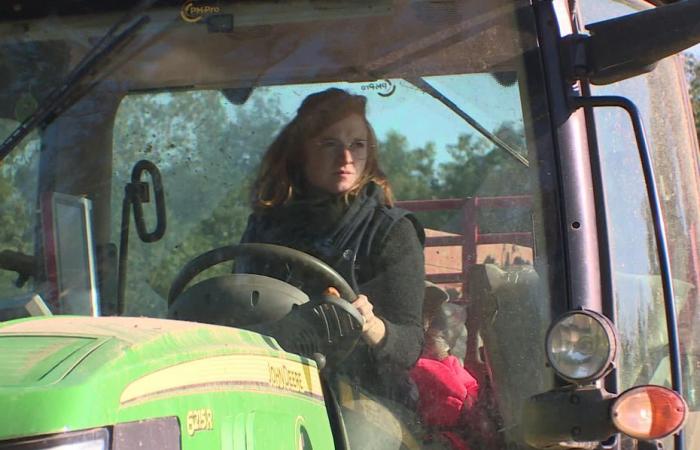A year ago, farmers began turning over town signs as a sign of discontent. A first warning before a mobilization which gained momentum in January: entire processions of farmers and their tractors converged on Paris to make their anger heard. What is their situation today? Were they listened to?
The essentials of the day: our exclusive selection
Every day, our editorial team reserves the best regional news for you. A selection just for you, to stay in touch with your regions.
France Télévisions uses your email address to send you the newsletter “The essentials of the day: our exclusive selection”. You can unsubscribe at any time via the link at the bottom of this newsletter. Our privacy policy
10 months ago, farmers were driving towards the capital. At the heart of this unprecedented mobilization, 120 proposals to save the agricultural world. “We especially don’t want to enter Paris, but tell Emmanuel Macron that we have to stop talking, we have to act !” Luc Smessaert, the vice-president of the FNSEA, told us on January 29.
But, according to the majority of professionals in the sector, these demands are far from having been heard. We found Luc Smessaert on his farm in Oise and it is clear that the farmer is not convinced. “We feel that we have made an unprecedented movement, never seen before. And then, that the politicians made fun of us a little. We had a lot of commitment and to date, apart from fuel, we have not had any impact.”
On his farm in Roy-Boissy, in Oise, Luc Smessaert, vice-president of the FNSEA, deplores the loss of steam in the commitment made to help farmers.
•
© Jérôme Arrignon / FTV
Every morning, he takes care of his hundred dairy cows. They produce 2,500 liters of milk per day, but the unstable market is a source of concern. “The difficulties today are having a real vision of our productions, he laments. Will we have guaranteed prices? Taking production costs into account in their entirety, including time spent? We need this. And behind, of course, if we have income, if we also manage to take a few days off, it will be a more viable, more livable job.“
So tomorrow, if I have to go back there, if there is a movement that starts again, I will go up even more [sur son tracteur].
Luc Smessaert,vice-president of the FNSEA
Another strong demand: administrative simplification. In Mortiers, in Aisne, the beet harvest is in full swing. Louise Piércourt took over the family farm 5 years ago years, but although coming from the agricultural world, the procedure for its installation was long and complex.
“Following the demonstrations, our requests were really to simplify the files, so, for example, to have a website where we can find all our documents: wine merchants, company statutes, owners, etc., precisely so as not to have this redundancy of giving the same papers back to the administration. Today, the simplifications that have been put in place are very rare.”
Louise Piércourt, president of the Young Farmers of Oise, is calling for more accessibility and ease in the administrative procedures that handicap farmers on a daily basis.
•
© Jérôme Arrignon / FTV
“The grain harvest this year was bad. We have a health crisis among sheep and cattle. Hail and floods on the vines. This year, all sectors have been undermined. On everything that we already asked for a year ago, things have been done, but not enough for it to be concrete on our farms, so yes, it can start again very quickly in demonstrations.”
This year, all the sectors have been undermined (…), so yes, there could be protests very quickly. Especially with the economic context and cash flow problems, perhaps the demonstrations will be of the same magnitude.
Louise Piércourt,president of the Young Farmers of Oise
A few kilometers away, in another beet field, Bruno Cardot’s production is affected by a disease which dries out the leaves and reduces sugar levels. Until now, he used chemical inputs. But for Bruno, the worry “It is that we don’t necessarily have the same tools that we once had that worked really well on this and we no longer have them. And, the icing on the cake which annoys me quite a bit : I have European neighbors who still have these tools, they are chemical molecules and we no longer have them.”
This unfair competition was denounced during the demonstrations. Farmers are waiting for change as soon as possible. “I really have the feeling, since the demonstrations, that French agriculture must hide in order to die. Frankly, I have those feelings. We were angry. I have colleagues today who are disappointed, resigned.”
“Love us, we’ll do the rest”: a sort of slogan that Bruno Cardot, a farmer in Moÿ-de-l’Aisne, has been sporting for almost 5 years.
•
© Jérôme Arrignon / FTV
Resigned, Bruno is not. He put on the yellow vest he wore on the A4 roadblock. Like him, many farmers are ready to get back on the road.
For the Axonian farmer, all these crises are accelerators. A chance, a victory, he believes. “That’s the positive point. But the MSA said it this week : the agricultural malaise is even deeper than in January. Since nothing has been resolved, the income is still not there. We took a break from the European and legislative elections, which weighed down the economy. A big victory for January’s anger is that 85 % of French people were completely with us. There are very few social movements where we have so many opinions with us.“
However, the fight continues. “Agricultural anger is still relevant today, Bruno specifies. (…) It’s already fortunate that I was able to have the time to go there and I actually took care to try to speak out to those who couldn’t come. Because I have lots of colleagues who had to be with the animals and then, it’s also resources. You have to be able to be replaced on the farms to go on vacation, but also to go to demonstrations and that is not easy.“
The tractors are hot and once we finish seeding, we will also be back on the streets.
Bruno Cardot,farmer in Moÿ-de-l’Aisne
And anger is already brewing. In the Pyrénées-Orientales, municipal panels have been dismantled. If new concrete measures are not announced, Picardy farmers could in turn join the movement.
Edited by Chloé Caron / FTV






